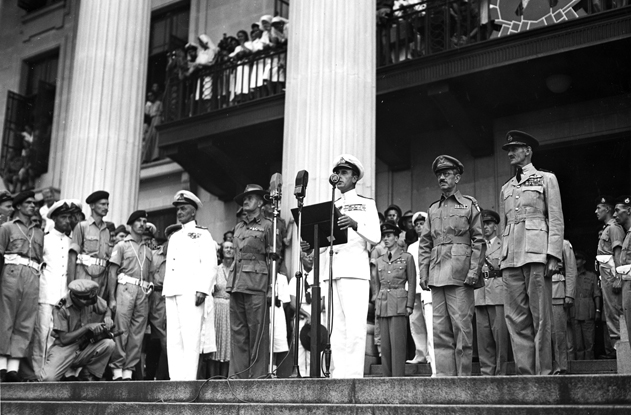On 6 and 9 August 1945, U.S. B-29 bombers dropped two atomic bombs on the Japanese cities of Hiroshima and Nagasaki. On 8 August 1945, Soviet Union declared war on Japan and invaded Manchuria. The bombing of Hiroshima and Nagasaki along with the entry of Soviet Union into the war ended the Japanese occupation of Southeast Asia. By then, the Japanese allowed the Allies to send in forces and food supplies. Prisoners-of-war were checked by medical officers and arrangements were made to send them home.
On 15 August, Japan announced its surrender. The formal signing of the surrender instrument was held at City Hall, Singapore, then known as "Municipal Hall", on 12 September. This was followed by a celebration at the Padang, which included a victory parade. Lord Louis Mountbatten, Supreme Allied Commander of South East Asia Command, came to Singapore to receive the formal surrender of the Japanese forces in the region from General Seishirō Itagaki on behalf of General Hisaichi Terauchi. A British military administration utilizing surrendered Japanese troops as security forces was formed to govern the island until March 1946.
After the Japanese surrendered, there was a state of anomie in Singapore, as the British had not yet arrived to take control. The Japanese occupiers had a considerably weakened hold over the populace. There were widespread incidents of looting and revenge-killing. Much of the infrastructure had been wrecked, including the harbour facilities and electricity, water supply, and telephone services. It took four or five years for the economy to return to pre-war levels. When British troops finally arrived they met with cheering and fanfare.
Banana money became worthless after the occupation ended. Many individuals who had acquired their wealth through banana currency were rendered penniless overnight.
I was so happy that the Japanese surrendered as finally the killing has stop and alot of people gathered outside City Hall to witness the signing of the surrender.People cheered loudly and even people shouting,screaming and scolding the Japanese when they was walking out of
Fort Siloso. i myself also was angry at them but i was to happy too even be angry at them. after the signing, the remaining japanese soldier was ordered to clean up. so committed suicide instead of cleaning up as they was shamed that their own country surrendered.I was also surprise to know that in Japan, their own people don't even know what is going on around them they was so shielded away from what was going on. after the Japanese know what happen, they was so remorseful. i pity those who was bombed in japan as they dont even know what was going on and they just died.Now, i really know how important Total Defense Day(15 February) is for Singapore.

 Source:http://en.wikipedia.org/wiki/Operation_Tiderace(Date Accessed:13 Feb 2013)
Source:http://en.wikipedia.org/wiki/Operation_Tiderace(Date Accessed:13 Feb 2013)
No comments:
Post a Comment